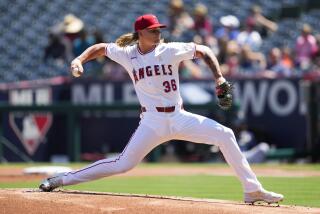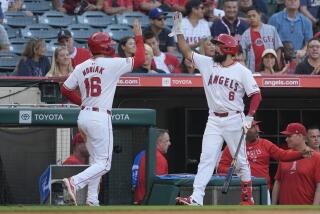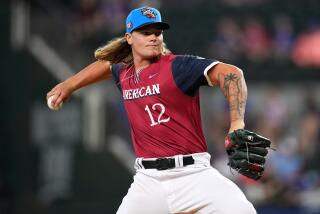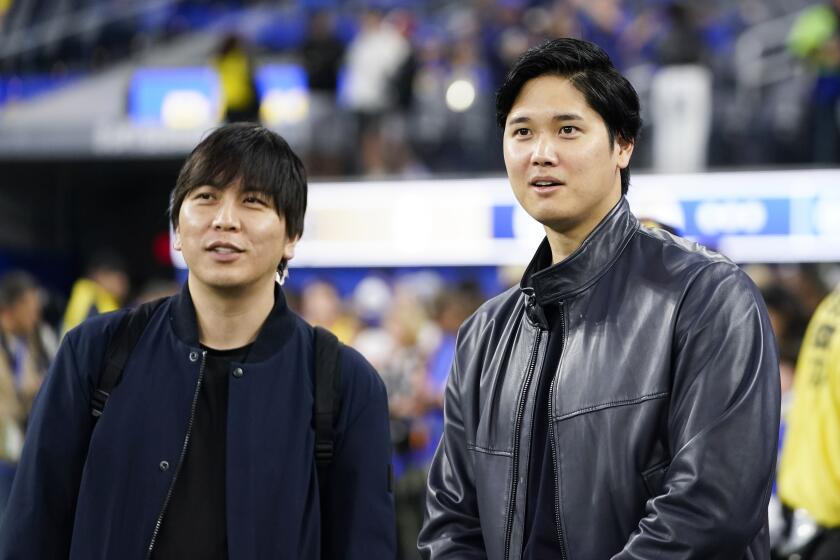His Ship Comes In : Amaral’s Patience Pays Off as Mariners End His Tour of Minors
ANAHEIM — It’s a puzzle . . . Why do you draft (a player) and then ignore him even when he plays well? --Bill James on Rich Amaral in The Baseball Book, 1991
While listening for that obvious question, Seattle Mariners Manager Lou Piniella cut the query short.
“I have no explanation,” he said.
Piniella could not explain why Amaral, at 31 the oldest rookie in the majors, spent a decade in the minors before finding steady work in the big leagues.
He couldn’t explain why Amaral, who hit .319 for three seasons in triple A, couldn’t crack a major league starting lineup during that span.
Instead of explaining, Piniella just pencils Amaral’s name into the Mariners’ starting lineup.
Amaral, who played at Estancia High, Orange Coast College and UCLA, is a fixture in the infield for Seattle this season, hitting .298. He leads the team with 12 stolen bases heading into today’s 1 p.m. game against the Angels at Anaheim Stadium after sitting out Saturday night’s 2-0 Mariner victory.
“Hey, I watched the guy win a (Pacific Coast League) batting title at Calgary in 1991, so nothing he does surprises me,” Seattle infielder Mike Blowers said. “In fact, I expect him to do well. He’s done a great job here; he’s just refused to give up.”
Amaral, who hit .346 at triple-A Calgary in 1991, has encountered numerous roadblocks before driving himself into a starting job at second base for Seattle this season.
The Chicago Cubs drafted Amaral in 1983 after he hit .341 and earned All-Pac-10 honors at UCLA.
But that same season, the Cubs moved Ryne Sandberg from third base to second. All Sandberg has done is collect nearly 2,000 hits and 235 home runs in a potential Hall of Fame career.
Amaral got a glimmer of hope when the Chicago White Sox took him from the Cubs in the 1988 Minor League Rule V draft.
In 1989, Amaral hit .285 and scored a league-high 90 runs with the White Sox’s double-A affiliate in Birmingham, Ala. But a 32-day owners’ spring training lockout in 1990 dashed any hopes Amaral had of making the majors that season.
As a non-roster player, Amaral had to attend minor league camp, while his former Birmingham teammate Craig Grebeck, a 40-man roster member, went to the major league camp and was one of four rookies who left spring training with the White Sox.
“Grebeck got his chance, and he’s done well with it,” Amaral said. “What can you do? You can’t control what happens sometimes; that’s just baseball.
“I just accepted it. I love playing the game; that’s all you can do is keep plugging away. A lot of people give up too soon,” he said.
So after hitting .301 with a league-leading 39 doubles in 1990 with the White Sox’s triple-A affiliate in Vancouver, Amaral signed as a free agent with the Mariners that November.
Although the Mariners were set at second base with three-time Gold Glove winner Harold Reynolds, Amaral got his first shot at the big leagues in 1991.
Playing shortstop in his second game, May 28, Amaral tore ligaments in his left elbow after colliding with Kansas City Royals outfielder Kirk Gibson at second base on a stolen base attempt.
Amaral went on the disabled list May 29 and was eventually sent back to Calgary, where he finished his best minor league season. Last year, Amaral hit .318 with a league-leading 53 stolen bases for Calgary, earning a September call-up.
Although Reynolds left the Mariners this season, signing as a free-agent with Baltimore, the heir apparent at second for Seattle was prospect Bret Boone, a 23-year-old from El Dorado High and USC who hit .314 with 13 home runs at Calgary in 1992.
“Coming into spring training this season, I wasn’t thinking about anything but making the team as a utility infielder,” Amaral said.
But Amaral won the starting job at second base out of spring training, and Boone is in triple-A hitting over .300.
“He helps you win ballgames,” Piniella said. “He can hit well, bunt, run, field, play second, third, short . . . whether it’s as a starter or a valuable utility player, Richie will be around the major leagues for a long time.”
More to Read
Go beyond the scoreboard
Get the latest on L.A.'s teams in the daily Sports Report newsletter.
You may occasionally receive promotional content from the Los Angeles Times.






